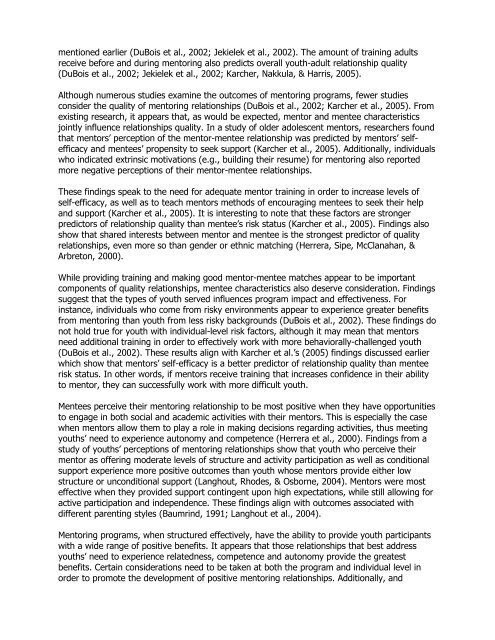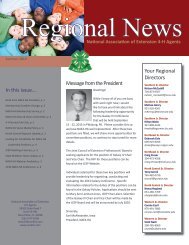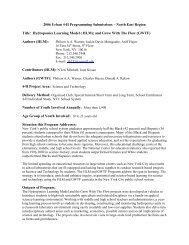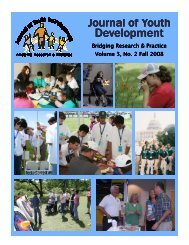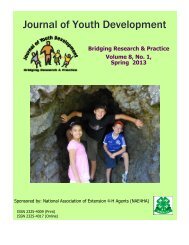Conversely, more modern educational practices have suggested that youth learn more whenteachers give them choices (e.g., Schweinle et al., 2006; Stefanou, Perencevich, DiCintio, &Turner, 2004). For example, ninth- and tenth-grade students who felt that school teachers,parents, and school administrators acted in autonomy-supportive ways had higher levels <strong>of</strong> selfdeterminedmotivation to stay in school; their perceptions <strong>of</strong> these social agents' meeting theirneeds for competence, autonomy, or both influenced their motivation, (Vallerand, Fortier, &Guay, 1997).High school physical education classes have also been studied using a SDT framework. In onestudy, Standage, Duda, and Ntoumanis (2003) found that the manner in which studentsperceive situational cues from their PE teacher related to their intentions to engage in futurephysical activities. Students felt more autonomous, competent, and related when they perceivedan autonomy-supportive environment low in controlling features, and to a lesser extent,perceived PE class as <strong>of</strong>fering a mastery (e.g., cooperative, volitional) climate.In a related study, Ntoumanis (2005) found that PE teachers’ support <strong>of</strong> their 15-year-oldstudents’ needs for competence, relatedness, and autonomy positively predicted selfdeterminedmotivation. This was further linked to positive affective, cognitive, and behavioraloutcomes, and positive intentions to engage in optional PE activities the next year. Studentswho felt competent in freely-chosen PE were more likely than those for whom PE was requiredto find it interesting and want to continue participation. Students also felt related to others inthe friendships made through their PE participation. These studies suggest that students’experiences and participation levels can be influenced by opportunities for self-determinedmotivation.Soenens and Vansteenkiste (2005) examined the effects <strong>of</strong> the provision <strong>of</strong> autonomy oneducational outcomes. They found that teachers’ support <strong>of</strong> autonomy was significantly linkedto adolescent students’ grade point average, levels <strong>of</strong> vocational exploration and commitment,and self-determination in school- and job-seeking behaviors. Self-determined motivation toengage in academic activities was associated with higher perceived academic competence andhigher grades. As mentioned earlier, when the need for autonomy is met, self-determination toengage in prosocial behaviors <strong>of</strong>ten emerges.One-on-One MentoringResearch findings show that youth in quality mentoring relationships exhibit higher levels <strong>of</strong>school attendance and academic performance, better attitudes towards school, lower levels <strong>of</strong>substance abuse and some deviant behaviors, and improved family relationships than thosewithout mentors (DuBois, Holloway, Valentine, & Cooper, 2002; Grossman & Tierney, 1998;Jekielek, Moore, Hair, & Scarupa, 2002). As noted, these outcomes only occur in certain types<strong>of</strong> mentoring relationships. It appears that youth realize the most benefits from mentoringwhen they can establish a supportive, long term relationship with a mentor who addresses theirneed to experience competence and autonomy.Certain characteristics are associated with mentoring relationships that foster feelings <strong>of</strong>relatedness. For example, the frequency <strong>of</strong> contact between mentor and mentee and theduration <strong>of</strong> their relationship appear very important. Findings from a large study <strong>of</strong> Big BrotherBig Sister participants, suggest that relationships that last at least 12 months produce thegreatest positive benefits, whereas relationships that last less than three months negativelyimpact self-worth and academic efficacy (Grossman, & Rhodes, 2002). Similar findings showthat more contact between mentors and mentees also lead to many <strong>of</strong> the same benefits
mentioned earlier (DuBois et al., 2002; Jekielek et al., 2002). The amount <strong>of</strong> training adultsreceive before and during mentoring also predicts overall youth-adult relationship quality(DuBois et al., 2002; Jekielek et al., 2002; Karcher, Nakkula, & Harris, 2005).Although numerous studies examine the outcomes <strong>of</strong> mentoring programs, fewer studiesconsider the quality <strong>of</strong> mentoring relationships (DuBois et al., 2002; Karcher et al., 2005). Fromexisting research, it appears that, as would be expected, mentor and mentee characteristicsjointly influence relationships quality. In a study <strong>of</strong> older adolescent mentors, researchers foundthat mentors’ perception <strong>of</strong> the mentor-mentee relationship was predicted by mentors’ selfefficacyand mentees’ propensity to seek support (Karcher et al., 2005). Additionally, individualswho indicated extrinsic motivations (e.g., building their resume) for mentoring also reportedmore negative perceptions <strong>of</strong> their mentor-mentee relationships.These findings speak to the need for adequate mentor training in order to increase levels <strong>of</strong>self-efficacy, as well as to teach mentors methods <strong>of</strong> encouraging mentees to seek their helpand support (Karcher et al., 2005). It is interesting to note that these factors are strongerpredictors <strong>of</strong> relationship quality than mentee’s risk status (Karcher et al., 2005). Findings alsoshow that shared interests between mentor and mentee is the strongest predictor <strong>of</strong> qualityrelationships, even more so than gender or ethnic matching (Herrera, Sipe, McClanahan, &Arbreton, 2000).While providing training and making good mentor-mentee matches appear to be importantcomponents <strong>of</strong> quality relationships, mentee characteristics also deserve consideration. Findingssuggest that the types <strong>of</strong> youth served influences program impact and effectiveness. Forinstance, individuals who come from risky environments appear to experience greater benefitsfrom mentoring than youth from less risky backgrounds (DuBois et al., 2002). These findings donot hold true for youth with individual-level risk factors, although it may mean that mentorsneed additional training in order to effectively work with more behaviorally-challenged youth(DuBois et al., 2002). These results align with Karcher et al.’s (2005) findings discussed earlierwhich show that mentors’ self-efficacy is a better predictor <strong>of</strong> relationship quality than menteerisk status. In other words, if mentors receive training that increases confidence in their abilityto mentor, they can successfully work with more difficult youth.Mentees perceive their mentoring relationship to be most positive when they have opportunitiesto engage in both social and academic activities with their mentors. This is especially the casewhen mentors allow them to play a role in making decisions regarding activities, thus meetingyouths’ need to experience autonomy and competence (Herrera et al., 2000). Findings from astudy <strong>of</strong> youths’ perceptions <strong>of</strong> mentoring relationships show that youth who perceive theirmentor as <strong>of</strong>fering moderate levels <strong>of</strong> structure and activity participation as well as conditionalsupport experience more positive outcomes than youth whose mentors provide either lowstructure or unconditional support (Langhout, Rhodes, & Osborne, 2004). Mentors were mosteffective when they provided support contingent upon high expectations, while still allowing foractive participation and independence. These findings align with outcomes associated withdifferent parenting styles (Baumrind, 1991; Langhout et al., 2004).Mentoring programs, when structured effectively, have the ability to provide youth participantswith a wide range <strong>of</strong> positive benefits. It appears that those relationships that best addressyouths’ need to experience relatedness, competence and autonomy provide the greatestbenefits. Certain considerations need to be taken at both the program and individual level inorder to promote the development <strong>of</strong> positive mentoring relationships. Additionally, and
- Page 2 and 3:
Winter 2008Volume 3 Number 3Editor
- Page 5: Examining the Potential Unintended
- Page 8 and 9: centered, multidisciplinary approac
- Page 10 and 11: Volume 3, Number 3, Winter 2008Arti
- Page 12 and 13: fostering skill learning and positi
- Page 14 and 15: Table 1Participation in out-of-scho
- Page 16 and 17: ResultsOur analyses were conducted
- Page 18 and 19: watching TV, playing video games or
- Page 20 and 21: Accordingly, this research augments
- Page 22 and 23: Dotterer, A.M., McHale, S.M., & Cro
- Page 24 and 25: A Descriptive View of the 4-H Club
- Page 26 and 27: In this paper, the results of a cro
- Page 28 and 29: section is a set of statements that
- Page 30 and 31: Table 3Experience in the 4-H clubNo
- Page 32 and 33: significantly higher than Caucasian
- Page 34 and 35: p
- Page 36 and 37: This study focused only on the 4-H
- Page 38 and 39: Theokas, C., Lerner, J.V., Phelps,
- Page 40 and 41: Volume 3, Number 3, Winter 2008Arti
- Page 42 and 43: potential for reaching audiences, d
- Page 44 and 45: Putting Marketing Concepts into Pra
- Page 46 and 47: 2. Find out what others think about
- Page 48 and 49: Diem, K.G. (1994). What do youth li
- Page 50 and 51: Promoting Supportive Relationships
- Page 52 and 53: focused on youth-adult relationship
- Page 56 and 57: perhaps most importantly, the effic
- Page 58 and 59: Organized youth programs, when stru
- Page 60 and 61: likely to internalize the positive
- Page 62 and 63: Ellis, J.M., & Caldwell, L.L. (2005
- Page 64 and 65: Schweinle, A., Meyer, D.K., & Turne
- Page 66 and 67: Volume 3, Number 3, Winter 2008Arti
- Page 68 and 69: This study uses the “5 Cs” mode
- Page 70 and 71: ResultsIn this analysis 48 codes we
- Page 72 and 73: Table 3Inductive Codes Classified b
- Page 74 and 75: CompetenceCompetence in organized s
- Page 76 and 77: ecause of him (the coach)…. You d
- Page 78 and 79: practices and competitions, the gir
- Page 80 and 81: Eccles, J.S., & Gootmann, J.A. (Eds
- Page 82 and 83: Smoll, F.L., & Smith, R.E. (2002).
- Page 84 and 85: Volume 3, Number 3, Winter 2008Arti
- Page 86 and 87: The present work builds upon that o
- Page 88 and 89: MethodSample and Data CollectionAs
- Page 90 and 91: (scores ranging from 0 to 8) and a
- Page 92 and 93: Table 2Paired Sample T-tests Compar
- Page 94 and 95: Hypotheses 5 and 6 were tested by c
- Page 96 and 97: De Coverly Veale, D.M.W. (1987). Ex
- Page 98 and 99: Story, M., Neumark-Sztainer, D., Sh
- Page 100 and 101: Volume 3, Number 3, Winter 2008Arti
- Page 102 and 103: Cronbach’s Alpha Score For Youth
- Page 104 and 105:
12 to 18 years old. Fourteen of the
- Page 106 and 107:
Therefore, there was a mixed relati
- Page 108 and 109:
Youth respondents identified two ob
- Page 110 and 111:
are developed through working in a
- Page 112 and 113:
Seevers, B.S., & Dormody, T.J. (199
- Page 114 and 115:
Volume 3, Number 3, Winter 2008Arti
- Page 116 and 117:
With the many opportunities that yo
- Page 118 and 119:
meaningfully reduced involving dedu
- Page 120 and 121:
StaffingXTime/Schedule X X XTrainin
- Page 122 and 123:
“Involving adults that will allow
- Page 124 and 125:
“They can't drive or do not have
- Page 126 and 127:
page in understanding why youth voi
- Page 128 and 129:
Parker, L. (1999). If all youth ser
- Page 130 and 131:
Volume 3, Number 3, Winter 2008Arti
- Page 132 and 133:
However, the literature is mixed in
- Page 134 and 135:
group was the quality of the progra
- Page 136 and 137:
Table 1Reasons for Non-Attendance:
- Page 138 and 139:
easons given was six. Sixty-three p
- Page 140 and 141:
The non-family-related activities t
- Page 142 and 143:
“Catch ‘Em Being Good:”An Ext
- Page 144 and 145:
In 2001, the WVUES received a schoo
- Page 146 and 147:
to leverage the resources of the co
- Page 148 and 149:
4. Most primary behavior incidents
- Page 150 and 151:
Recommendations for developing prog
- Page 152 and 153:
Cross-Cultural UnderstandingThrough
- Page 154 and 155:
that plague these nations such as p
- Page 156 and 157:
2003). Youth leadership training in
- Page 158 and 159:
• enable these young people to pa
- Page 160 and 161:
We believe that the USPORT program
- Page 162 and 163:
West Virginia’s Response to theRo
- Page 164 and 165:
Ensuring good oral health requires
- Page 166 and 167:
Table 1Correlations between Planner
- Page 168 and 169:
problems in this rural state…This
- Page 170 and 171:
Volume 3, Number 3, Winter 2008Arti
- Page 172 and 173:
vacuum. Determination of factors, a
- Page 174 and 175:
ReferencesBaldwin, C., & Caldwell,
- Page 176 and 177:
Volume 3, Number 3, Winter 2008Arti
- Page 178 and 179:
Purpose of StudyThe purpose of this
- Page 180 and 181:
Students in the High computer gamin
- Page 182 and 183:
Do Higher Levels of 4-H LeadershipA
- Page 184 and 185:
IntroductionEmotional Intelligence
- Page 186 and 187:
second section examined demographic
- Page 188 and 189:
a constructive manner. The group is
- Page 190 and 191:
differences in the scores for the 1
- Page 192 and 193:
Adaptability include “Reality Tes
- Page 194 and 195:
ReferencesAmerican Academy of Pedia
- Page 196 and 197:
Healthy Kids, Healthy Families:A Co
- Page 198 and 199:
and a half million U.S. youth (ages
- Page 200 and 201:
Families. In partnering counties, p
- Page 202 and 203:
Healthy Families was then offered a
- Page 204 and 205:
Kamberelis, G., & Dimitriadis, G. (
- Page 206 and 207:
Volume 3, Number 3, Winter 2008Arti
- Page 208 and 209:
Change It Up!What Girls Say About R
- Page 210:
In addition, the study summarizes t


